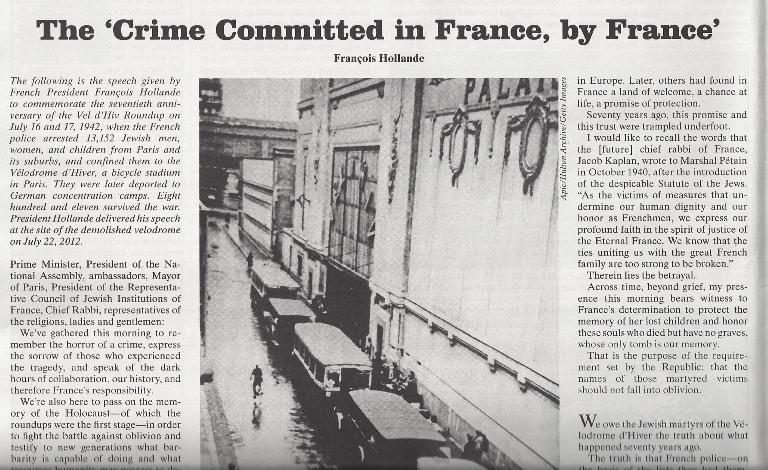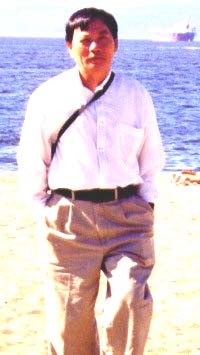|
|

The ‘Crime
Committed in France, by France’
September
27, 2012
François
Hollande
The
following is the speech given by French President François Hollande to
commemorate
the seventieth anniversary of the Vel d’Hiv Roundup on July 16 and 17,
1942,
when the French police arrested 13,152 Jewish men, women, and children
from
Paris and its suburbs, and confined them to the Vélodrome d’Hiver, a
bicycle
stadium in Paris. They were later deported to German concentration
camps. Eight
hundred and eleven survived the war. President Hollande delivered his
speech at
the site of the demolished velodrome on July 22, 2012.
Prime
Minister, President of the National Assembly, ambassadors, Mayor of
Paris,
President of the Representative Council of Jewish Institutions of
France, Chief
Rabbi, representatives of the religions, ladies and gentlemen:
We’ve
gathered this morning to remember the horror of a crime, express the
sorrow of
those who experienced the tragedy, and speak of the dark hours of
collaboration, our history, and therefore France’s responsibility.
We’re also
here to pass on the memory of the Holocaust—of which the roundups were
the
first stage—in order to fight the battle against oblivion and testify
to new
generations what barbarity is capable of doing and what resources
humanity may
possess to defeat it.
Seventy
years ago, on July 16, 1942, early in the morning, 13,152 men, women,
and
children were arrested in their homes. Childless couples and single
people were
interned in Drancy, where the museum created by the Mémorial de la
Shoah will
stand in the autumn.
The others
were taken to the Vélodrome d’Hiver. Thrown together for five days in
inhuman
conditions, they were taken from there to the camps of Pithiviers and
Beaune-la-Rolande.
A clear
directive had been given by the Vichy administration. “The children
must not
leave in the same convoys as the parents.” So, after heartrending
separations,
they departed—the parents on one side, the children on the other—for
Auschwitz-Birkenau, where the deportees of Drancy had preceded them by
a few
days.
There, they
were murdered. Solely for being Jews.
This crime
took place here, in our capital, in our streets, the courtyards of our
buildings, our stairways, our school playgrounds.
It was to
prepare the way for other roundups, in Marseille and throughout
France—in other
words, on both sides of the demarcation line. There were also other
deportations, notably of gypsies.
The infamy
of the Vel d’Hiv was part of an undertaking that had no precedent and
has no
comparison: the Holocaust, the attempt to annihilate all the Jews on
the
European continent.
Seventy-six
thousand French Jews were deported to the death camps. Only 2,500
returned.
Those women,
men, and children could not have known the fate that awaited them. They
could
not even have imagined it. They trusted in France.
They
believed that the country of the great Revolution and …
Tội
Ác của Tây Mũi Lõ, tại nước Tẩy
|

